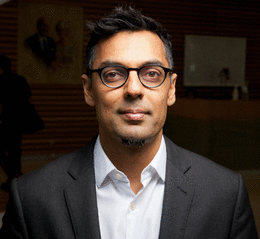Article Text
Statistics from Altmetric.com

Biography
Dr Kamran Khan is an infectious disease physician and a Professor of Medicine and Public Health at the University of Toronto. After completing his training in infectious diseases, preventive medicine and public health, he returned to Toronto just before SARS crippled the city during the 2003 outbreak. Deeply motivated by this event, Kamran has dedicated his career to developing solutions that help the world better prepare for and respond to tomorrow’s infectious disease threats. Based at the Li Ka Shing Knowledge Institute of St Michael’s Hospital, he is the Founder and CEO of BlueDot, an epidemic intelligence company that helps governments and private enterprises build resilience to the growing number of disruptive outbreaks appearing in the world. BlueDot is a Canadian company located in Toronto, Ontario which was among the first in the world to identify the emerging risk from SARS-CoV-2 in Hubei province and published the world’s first peer-reviewed study accurately predicting its early global spread. His research interests focus on human migration, international travel and the globalisation of emerging infectious diseases.
What are the key leadership messages you want to get out to the BMJ Leader readership?
Spanish philosopher George Santayana once said, ‘Those who cannot remember the past are condemned to repeat it.’1 This is a pivotal moment as we enter the recovery phase of the COVID-19 pandemic, where we may be inclined to revert back to our reactive ways of confronting infectious disease emergencies. What the world needs more than ever is a proactive and preventive mindset, and that requires tenacity and leadership.
My interest in emerging infectious diseases started with the international SARS-CoV epidemic in 2003, and here we are today in a pandemic caused by SARS-CoV-2. Between the nearly two decades in between, I have learned that humans are reactive creatures, capable of rapidly mobilising vigorous responses to infectious disease emergencies. However, when threats abate, we have a …
Footnotes
Author note Interview date: 10 April 2022.
Contributors SG drafted the manuscript based on the interview. KK edited the manuscript. Both authors approved the final manuscript.
Funding The authors have not declared a specific grant for this research from any funding agency in the public, commercial or not-for-profit sectors.
Competing interests None declared.
Provenance and peer review Not commissioned; externally peer reviewed.


